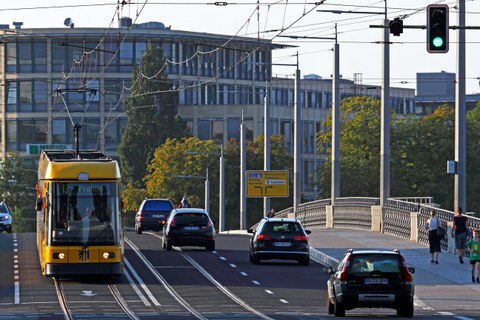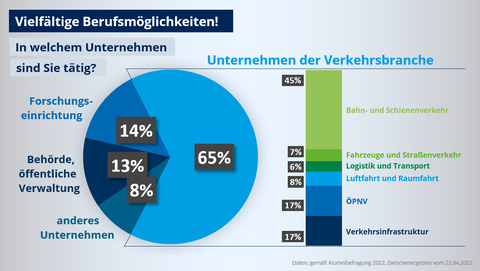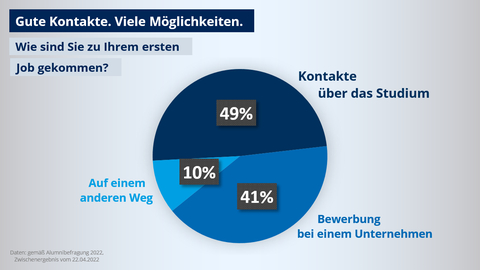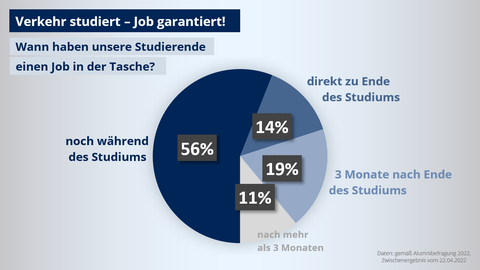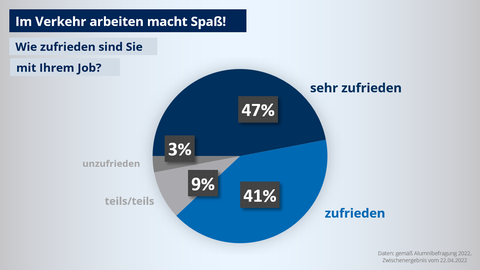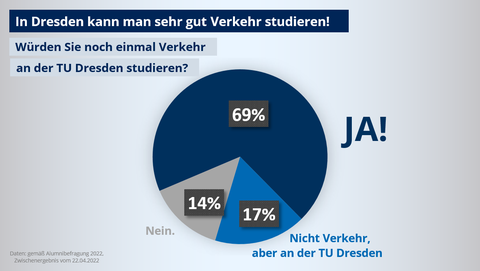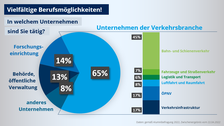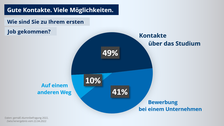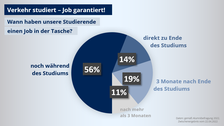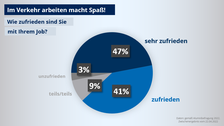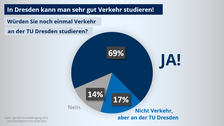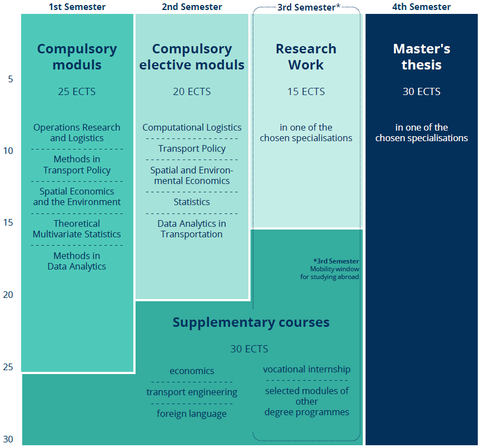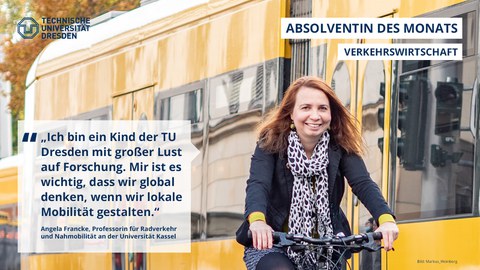Transportation Economics (Master)
Mobilität bestimmt die Teilhabe am sozialen und wirtschaftlichen Leben, die räumliche Struktur der Gesellschaft sowie das Ausmaß verkehrsbedingter Umweltwirkungen. Ihre Gestaltung steht vor immensen Herausforderungen. So stehen Verkehrsmittel (automatisiertes Fahren, elektrische Fahrzeuge, Drohnen, Hochgeschwindigkeitsbahnen), die Organisation des Verkehrs (intermodale Mobilität, Sharing Technologien, Mobilitätsplattformen, Nutzung großer Datenmengen), die Verkehrsinfrastruktur (intelligente Straßen, Ladestationen) wie auch die Finanzierung von Mobilität (Nutzerfinanzierung) vor weitreichenden Veränderungen.
Daraus ergeben sich umfangreiche verkehrswirtschaftliche und methodische Aufgaben auf betrieblicher, gesellschaftlicher und methodischer Ebene. Dieser Studiengang bietet das Wissen und die Methoden, die erforderlich sind, um die Herausforderungen von Mobilität im Hinblick auf ihre ökonomischen, ökologischen und räumlichen Wirkungen zu verstehen, zu erforschen und zu gestalten.

© Benjamin Jenak, TUD

© Benjamin Jenak, TUD
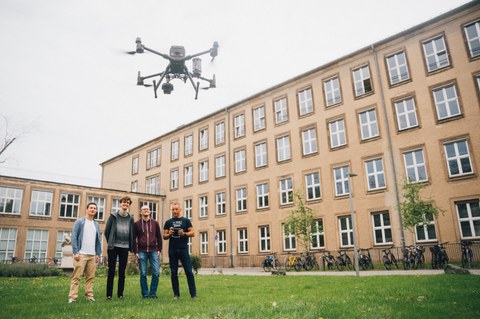
© Benjamin Jenak, TUD
| Abschluss | Master of Science (M.Sc.) |
| Regelstudienzeit | 4 Semester |
| Teilzeitstudium | möglich (50 %) |
| Numerus clausus | kein NC |
| Studienstart | Wintersemester (1. Oktober) |
| Bewerbungsfrist | 1. April – 15. Juli (EU Bewerber) 1. April – 31. Mai (Nicht-EU Bewerber) |
Verkehr studieren, das heißt Jobgarantie! 70 Prozent unserer Studierenden hat noch im Studium oder direkt am Ende des Studiums den ersten festen Job in der Tasche. Fast alle unsere Absolvent:innen steigen spätestens nach 3 Monaten Jobsuche in attraktive Karrierewege ein. Karriereplanung und -orientierung wird bei uns bereits im Studium groß geschrieben – mit jährlicher hauseigener Karrieremesse, Jobportal, Alumni-Verein und vielem mehr.
Wer Transportation Economics studiert hat, kann in Verkehrs- und Logistikabteilungen im In- und Ausland arbeiten, insbesondere bei Verbänden und öffentliche Organisationen, öffentlichen Verwaltungen, Ministerien, Politik und Politikberatung, Forschungs- und Lehrinstitutionen und in Abteilungen für Data Science.
Das Studium beginnt mit fünf Pflichtmodulen, die inhaltlich die wesentlichen Bereiche der Verkehrswirtschaft thematisieren und wichtiges methodisches Knowhow vermitteln.
Anschließend sind zwei der folgenden fünf Schwerpunkte zu wählen:
- Computational Logistics: Inhalte sind analytische Methoden zur Problemlösung und Entscheidungsunterstützung in Verkehrs- und Logistikunternehmen sowie zum Management von Transportsystemen und -dienstleistungen.
- Transport Policy: Inhalte sind ökonomische und ökonometrische Methoden zur Analyse einer Vielzahl verkehrsökonomischer und verkehrspolitischer Fragestellungen (z. B. zu Emissionen, Stau, Lärm oder Sicherheit) sowie die Entwicklung und Bewertung adäquater verkehrspolitischer Maßnahmen.
- Spatial and Environmental Economics: Inhalte sind ökonomische und ökonometrische Methoden zur Analyse der räumlichen, ökonomischen und umweltbezogenen Wirkung von Mobilität in Städten und Regionen sowie die Evaluation und Entwicklung von relevanten Politikinterventionen zur Verbesserung der räumlichen Allokation und der Reduktion von negativen Umweltfolgen des Verkehrs.
- Statistics: Inhalte sind Verfahren der multivariaten Statistik. Es erfolgt sowohl eine Darstellung der theoretischen Grundlagen, als auch die Anwendung der Verfahren auf Daten aus Verkehr und Wirtschaft.
- Data Analytics in Transportation: Inhalte sind Methoden der Datenanalyse und deren Anwendung, die u. a. für die Erstellung und Auswertung von Umfragen und Experimenten sowie die Bearbeitung strukturierter und unstrukturierter verkehrsbezogener Daten (Big Data) im Verkehrsbereich relevant sind.
Mit ergänzenden, frei belegbaren Wahlpflichtmodulen können die wirtschaftlichen Inhalte und Kompetenzen vertieft und erweitert werden. Dabei kann nicht nur aus verkehrswirtschaftlichen Modulen, sondern auch aus Modulen der Wirtschaftswissenschaften und dem Verkehrsingenieurwesen gewählt werden. Darüber hinaus besteht die Möglichkeit, Fremdsprachenkompetenz zu erwerben oder ein Berufspraktikum in den Studienablauf zu integrieren. Damit bietet dieser Studiengang ein hohes Maß an Flexibilität. Individuelle Vorstellungen, Wünsche und Interessen können in einem hohen Maß berücksichtigt werden.
Das Studium sieht im dritten Fachsemester ein Mobilitätsfenster vor. Dieses können Sie für den Besuch einer anderen Hochschule im Ausland oder für ein Berufspraktikum nutzen. Dabei können Sie bis zu 30 ECTS aus Modulen einer ausländischen Hochschule einbringen.
»Das Mobilitätsverhalten der Menschen wird sich in der Zukunft stark ändern, dafür will ich neue Konzepte und Lösungen entwickeln. Deswegen habe ich mich für das Verkehrswirtschaftsstudium an der TU Dresden entschieden.« (S. Breitkopf)
»Das Besondere des Studiengangs ist, dass die Fakultät nicht nur im Hinblick auf die fachliche Weiterentwicklung enorme Vorteile bietet, sondern auch der Zusammenhalt der Studierenden sehr besonders ist. Die Fakultät und besonders der Fachschaftsrat geben einem schnell ein Gefühl von Heimat, auch weit weg von zu Hause. Hinzu kommt, nicht zuletzt, die fachliche Expertise der Professoren.« (A. Straubinger)
»Dieser Studiengang ist immer noch relativ selten, aber in der Logistikbranche sehr gern gesehen. Viele Unternehmen suchen gezielt nach Absolventen der Verkehrswirtschaft. Es ist ein sehr interessantes, wichtiges und damit zukunftsrelevantes Berufsfeld.« (T. Wenk)
»Mit dem Studium erworbenen Fachkenntnissen können Absolventen viele Anforderungen erfüllen, welche auf dem Arbeitsmarkt gesucht werden. Außerdem bietet die Stadt Dresden alles, was Studierende suchen: Lernen und entspannen an den Elbwiesen, studierendenfreundliche Preise und jede Menge Kultur mit Semperoper, Kino und Theater.« (S. Breitkopf)
- Voraussetzung für die Aufnahme des Studiums ist ein erster in Deutschland anerkannter berufsqualifizierender Hochschulabschluss bzw. ein Abschluss einer staatlichen oder staatlich anerkannten Berufsakademie auf dem Gebiet der Verkehrs- oder Wirtschaftswissenschaften bzw. aus dem MINT-Bereich (Mathematik, Informatik, Naturwissenschaft und Technik) oder ein Abschluss in einem sonstigen Studiengang mit inhaltlich stark quantitativer Ausrichtung.
Liegt der Nachweis noch nicht vor, wird die Bewerbung auch dann berücksichtigt, wenn bereits 80 % der durch den Hochschulabschluss erreichbaren Leistungspunkte aufgrund von abgeschlossenen Modulprüfungen oder auch der Abschlussarbeit und ggf. des Kolloquiums durch Bescheinigung der Herkunftshochschule (Prüfungsamt) nachgewiesen werden. Das entsprechende Formular finden Sie auf den Seiten des Immatrikulationsamtes. - Darüber hinaus sind besondere Kenntnisse in den Bereichen Volkswirtschaftslehre, Betriebswirtschaftslehre und quantitative Verfahren (Mathematik, Statistik, Ökonometrie, Operations Research, Programmierung, Data Analytics) erforderlich.
- Zudem werden Englischkenntnisse auf dem Niveau B2 des Gemeinsamen Europäischen Referenzrahmens für Sprachen vorausgesetzt.
Der Nachweis der besonderen Kenntnisse sowie der Englischkenntnisse erfolgt gemäß Eignungsfeststellungsordnung für den Masterstudiengang Transportation Economics. Bei Bedarf wird ein Eignungsgespräch durchgeführt. Mehr Infos ⬇ nächster Abschnitt
Die Zugangsvoraussetzungen für den Master-Studiengang Transportation Economics sind in § 2 der Eignungsfeststellungsordnung (englische Version: hier) geregelt.
Gemäß § 5 liegt die besonderen Eignung zum Studium vor, wenn folgende Bedingungen erfüllt sind:
- Erwerb von mindestens sich inhaltlich nicht überschneidenden 60 ECTS aus den Fachbereichen Betriebswirtschaftslehre (BWL), Volkswirtschaftslehre (VWL) und quantitative Verfahren (Mathematik, Statistik, Ökonometrie, Operations Research, Programmierung, Data Analytics), davon:
- aus dem Fachbereich Volkswirtschaftslehre mindestens 15 Leistungspunkte, darin mindestens 4 Leistungspunkte im Fach Mikroökonomie
- aus dem Fachbereich Quantitative Verfahren mindestens 15 Leistungspunkte, darin mindestens 4 Leistungspunkte im Fach Statistik und 4 Leistungspunktein der Fächergruppe Operations Research, Optimierung und Programmierung
- aus dem Fachbereich Betriebswirtschaftslehre mindestens 15 Leistungspunkte.
- Bei insgesamt mehr als 30 sich inhaltlich nicht überschneidende Leistungspunkte in quantitativen Verfahren können in gleichem Umfang reduziert werden:
- die geforderten Leistungspunkte für BWL um bis zu 10 Leistungspunkte und
- die geforderten Leistungspunkte für VWL um bis zu 5 Leistungspunkte.
Den Nachweis der besonderen Eignung prüft der Zugangsausschuss anhand der dem Antrag beigefügten Unterlagen. Welche Unterlagen einzureichen sind, steht ausführlich beschrieben im § 4 Abs. 2 der Eignungsfeststellungsordnung (englische Version: hier). Entsprechend § 4 Abs. 2 Nr. 1 ist auch das unterschriebene Antragsformular "Antrag auf Feststellung der besonderen Eignung" einzureichen.
Alle Regelungen zum Studiengang sind in den Studiendokumenten definiert, die amtlich bekannt gegeben wurden:
Studienordnung (Amtliche Bekanntmachung vom 25.05.2021) (englische Version)
Erste Satzung zur Änderung der Studienordnung (03.02.2023) (englische Version)
Prüfungsordnung (Amtliche Bekanntmachung vom 27.05.2021) (englische Version)
Erste Satzung zur Änderung der Prüfungsordnung (03.02.2023) (englische Version)
Zur Anpassung an den aktuellen Bedarf können Module und der Studienablaufplan angepasst werden. Diese Anpassungen beinhalten die folgenden, nicht rechtsverbindlichen Lesefassungen:
Modulbeschreibungen (aktuelle Lesefassung), (englische Version)
Studienablaufplan (aktuelle Lesefassung), (englische Version)
Der Studiengang kann vollständig oder zeitweise in Teilzeit (50 %) studiert werden. Das eignet sich dann, wenn Sie neben dem Studium Kinder oder andere Angehörige pflegen oder selbst gesundheitlich beeinträchtigt sind.
Im Teilzeitstudium verdoppeln sich die Regelstudienzeit sowie die Prüfungsfristen. Zwischen Teilzeitstudium und Vollzeitstudium kann bei Bedarf semesterweise gewechselt werden. Mehr Infos zum Teilzeitstudium
Es wird ein gesonderter Studienablaufplan für das Teilzeitstudium empfohlen. Bei einem Wechsel zwischen Vollzeit- und Teilzeitstudium sind Anpassungen vorzunehmen:
Studienablaufplan Teilzeitstudium (aktuelle Lesefassung), (englische Version)
Im Video finden Sie alle Informationen zur Online Bewerbung an der TU Dresden. © TU Dresden
Haben wir Dich vom Verkehrsstudium überzeugt? Dann folge diesem Link, um wichtige Hinweise zu deiner Bewerbung zu bekommen und das richtige Bewerbungsportal für die Verkehrswissenschaften zu finden.
Bewerbungsfristen:
1. Juni – 15. September
1. April – 15. Juli für ausländische Studienbewerber:innen
Masterstudiengang Transportation Economics im Studieninformationssystem der TU Dresden
Multimediale Einblicke ins Studium
Verkehrswirtin Jessica bei ihrem ersten Job als Trainee bei der Deutschen Post © alpha Uni
Jessica hat von 2014 bis 2018 im Bachelor und von 2018 bis 2021 im Master Verkehrswirtschaft an der TU Dresden studiert. Im Januar 2023 wird sie als Sachgebietsleiterin für den Verkehr bei der Deutschen Post übernommen. Dann ist sie für die LKW Planung im Standort Ottendorf-Okrilla und das Team der Planer verantwortlich.
„Kind der Uni“ mit viel Lust auf Forschung. Weil sie ein eigenes Hotel leiten wollte, begann sie 1998 ein Studium der Verkehrswirtschaft an der TU Dresden. Im Grundstudium änderte sich ihr Fokus. Heute hat Angela Francke eine von bundesweit sieben Professuren für Radverkehr an der Universität Kassel inne. mehr Informationen
Kontakt
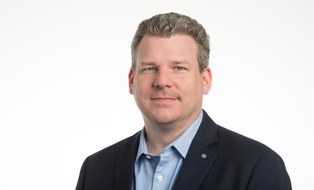 © Michael Kretzschmar
© Michael Kretzschmar
Studiendekan Verkehrswirtschaft
NameProf. Dr. rer. pol. habil. Jörn Schönberger
Eine verschlüsselte E-Mail über das SecureMail-Portal versenden (nur für TUD-externe Personen).
